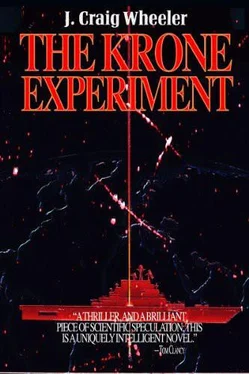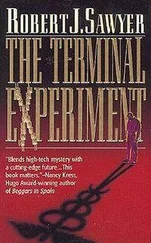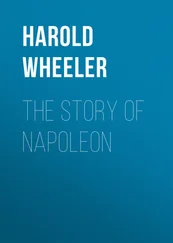“Mr. President,” Zamyatin continued, cordial and reasonable, “I do not expect a reply to our offers just now. I deduce you have only just learned of the problem. You will need some time to fully appreciate the situation, and the generosity of the proposals I have presented. I would remind you that there are factions in my government that are not amenable to such a cooperative approach. There are some who would advocate immediate public exposure, an attempt to wrest full propaganda value from your predicament. Others would contemplate far more serious and direct reprisals.
“Before I go, there is one other thing. I stress that we have proposed a cooperative approach to the problem at hand. We presume that you do not want the situation and your role in it to become widely known. We will follow your lead in such matters if you will but cooperate with us in one other regard. The problem with which we are now faced arose from a certain line of investigation.”
The Russian paused, holding the eyes of the President.
“We ask that you immediately cease all research and development on beam weapons and related technology.”
The room filled with a crescendo of outrage. General Whitehead was among the loudest, shouting, “I knew it, I knew they’d turn this against us.”
Zamyatin rose and departed, as if oblivious to the uproar his demand had caused.
“Mr. President,” General Whitehead continued to shout, “we cannot even think of responding to that crap. If we make the slightest concession there, they’ll come after our nuclear arms.”
The President cracked a loud palm down on the table, resulting in a rapid, strained silence.
“It’s nearly one a.m.,” the President said. “I’m going to adjourn this meeting. I want you all on call by six. In the meantime,” he addressed his National Security Advisor, “I want to know precisely the line of authority Zamyatin represents and the makeup of the other factions he mentioned.” He turned toward Drefke. “Howard, I want you, Isaacs and Professor Phillips to stay. I need a little more perspective on this.”
The President led them to an upstairs study and poured brandy all around. They sat in silence for awhile, each man trying to assimilate the rush of events in his own perspective. For Isaacs, the shock of Zamyatin’s announcements had waned, and he could feel the deep fatigue again, but he carried a burden he knew he must unload. He appreciated Drefke’s attempt, not completely altruistic, to avoid mention of Isaacs’ communications with Korolev. For that matter, Zamyatin could have roasted him, but chose not to. He knew, though, that the President could not reach a cogent decision without knowing all the background. From a strictly personal point of view, he would be better off confessing his involvement with the Russians rather than having the President discover it, as he surely would. He broke the silence.
“Mr. President.” The eyes of the three men swiveled to him. “I have been in on this affair from the beginning. There are some things about Zamyatin and Korolev you need to know.”
Drefke lifted his eyebrows in surprise, but remained silent.
“Let’s hear what’s on your mind,” the President said.
“I have been aware for some time,” said Isaacs, searching for the right words, “that there is a contingent in the Soviet Union that has some sympathy for our situation. I believe Academician Korolev is a key person in that contingent. I think that he has led them to the understanding that we are dealing with a black hole and that it was made here, but I think he recognizes the true nature of the problem, that it transcends geopolitics. Korolev is under pressure; he had to tell them what he knew. But he is sympathetic to us, and he had influence there. I believe the offer to have him work with us is highly significant, both scientifically and politically. Mr. President, I think it is crucial that we reach out to the people Korolev represents.”
“Even though they demand we abandon our research on beam weapons, giving them full head to develop an antimissile technology unilaterally?”
Isaacs had no reply to that.
The President looked sharply at Isaacs. “How can you be so sure that this one man can and will be of help to us?”
Isaacs knew what was coming. He looked at the floor and then back at the President. “I’ve been in touch with him,” he mumbled.
“What was that?” the President demanded.
“I said, I’ve been in touch with him,” Isaacs replied.
Phillips stared at Isaacs in surprise. Isaacs vividly recalled his private conversation with the physicist in La Jolla, his suppressed desire to confess his communications with Korolev.
“You mean the Agency has?” the President asked.
“No sir, it was a personal correspondence.”
“Personal?” the President blurted. “You mean to say you’ve been communicating with Korolev directly? On the most sensitive issue of the decade? Goddamnit, Howard,” he turned to Drefke, “don’t your people know what channels are for? I’ve got black holes in my back yard, laser cannons in the front, and hired hands sending post cards back and forth discussing policy!”
“At the time there were extenuating circumstances,” Isaacs attempted to explain.
“Extenuating?” the President exclaimed. “May I ask just what you and Korolev were discussing behind my back, that you didn’t care to have me know?”
“I knew that Korolev was in charge of the Novorossiisk investigation, that he was puzzled and frustrated by it. That much was clear from official communications. Our effort was bogged down after the Stinson was Sunk.
“Frankly, sir,” Isaacs continued, “I was frightened. I thought something was sinking ships, triggering a global confrontation. For a variety of reasons, my efforts were stymied. I thought that Korolev might have more luck getting to the bottom of things.”
Isaacs rolled the brandy snifter in his hands. “I told Korolev about the seismic signal and my suspicion that it was related to the damage to both ships.”
“You told him that?” The President was angry and bewildered. “You gave us away? Virtually inviting him to look for and find the black hole and pin it on us?” He rose and paced to a window, peering into the dark outside.
Isaacs spoke to his back, trying to explain more than defend his actions. “I had no idea we were dealing with a black hole at the time, certainly not that we were in any way responsible.”
The President turned from the window and spoke to Drefke. “My god, Howard, you sandbagged me! Did you know your man had been talking to the Russians? This borders on treason.”
“Jim,” implored Drefke, falling into old, first name habits, “it was a lot more complicated than that. Yes, I did know it, and I had already had it out with him. It’s not what it seems. You can’t take it out of context.”
“Why don’t you just put it into context for me then?” The President was still angry, frustrated at events that had spun so rapidly out of his control.
“The simple fact is that we wouldn’t be anywhere on this thing if it weren’t for Isaacs here,” Drefke continued his appeal. “The black hole would still be there, eating away, and we wouldn’t have the faintest idea. This thing was bound to blow up in our face one way or another. We know that after the Novorossiisk, one thing led to another and we’ve gotten into a fine jam over it, but we would still have no idea why. Isaacs broke every rule in the book to reach out to Korolev, but I agree with him that that contact is probably our only way out of this problem. Without Korolev, we could be dealing with a bunch of generals ready, anxious, to finger the button.
“As it is,” he continued, “there is some evidence that the Russians have been calmer to react than they would have been if Isaacs hadn’t been in touch with Korolev.”
Читать дальше











